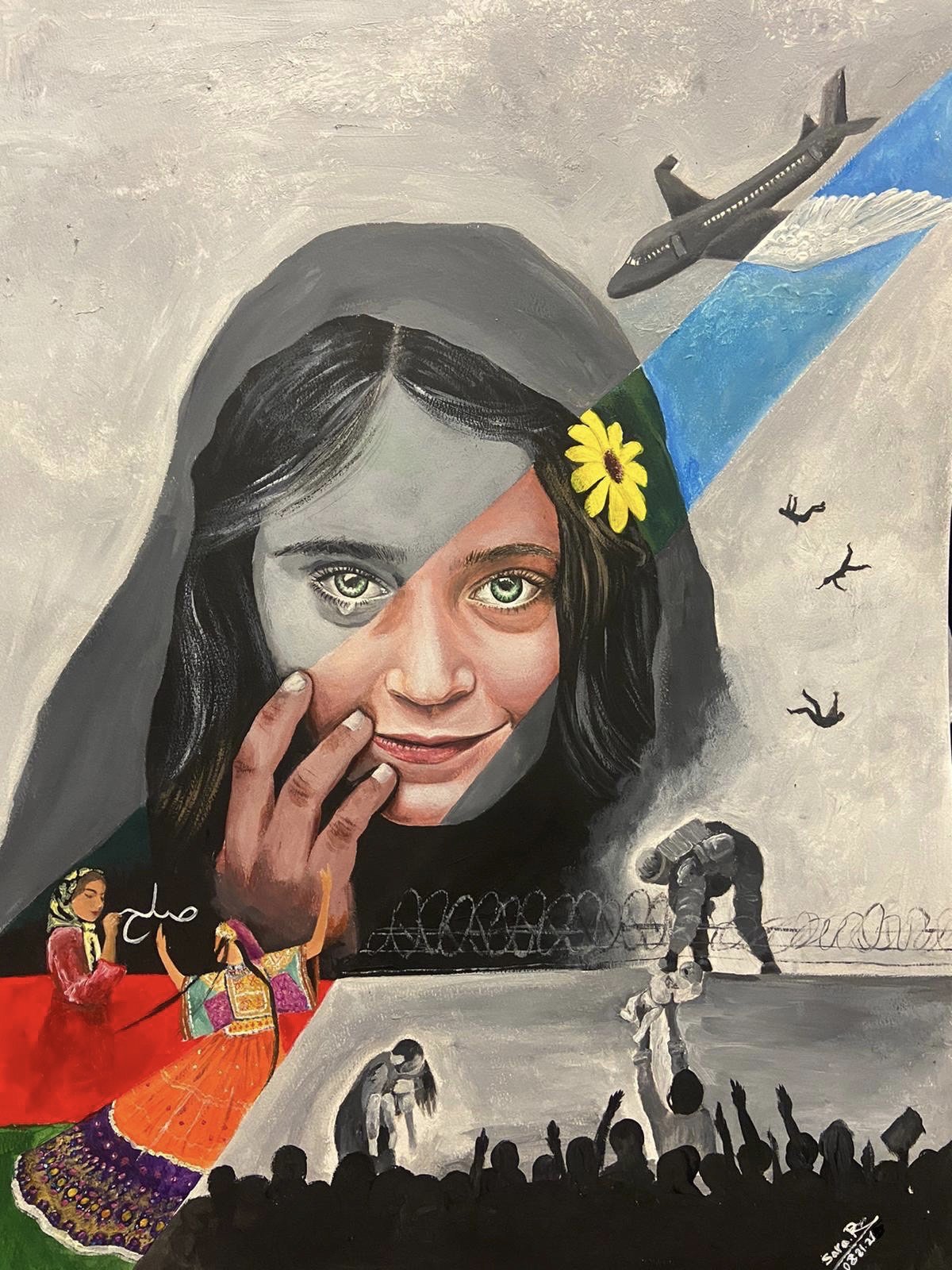Strokes of protest: the Afghan artist painting a brighter future
“It’s the people who inspire me to draw. I focus on eyes and emotions. More than anything else, I want to capture feelings on the canvas. It allows the viewer to connect with the painting” 25-year-old artist Sara Rahmani shares. (Courtesy of Sara Rahmani)
25-year-old Afghan artist Sara Rahmani uses her art to draw attention to the plight and courage of Afghan women.
Sara Rahmani describes the day the Taliban took control of her hometown of Kabul as “the darkest day of her life.” She recalls watching in horror as scenes of chaos at the Kabul airport filled the television screen. “It felt like salt on a wound. Like everything was happening all over again.”
Sara moved with her family to San Diego, California in 2017 where she was pursuing a degree in Civil Engineering. But she always planned to return to Afghanistan, where she saw a bright future for women. “I saw myself working with other women, starting my own company. I had so many dreams, but everything was suddenly multiplied by zero.” Growing up in Kabul in the years before the Taliban takeover, she was among the first generation who had access to freedoms denied to Afghan women for decades. Sara was able to go to school and enroll in a civil engineering programme at a university in Kabul. “We were three girls in a classroom full of boys and that had its own challenges,” she recalls.
“At the time I was feeling like the whole world had gone dark. It was so painful to see the events unfolding. The only way I could relieve this pain was to paint something.” (Courtesy of Sara Rahmani)
But she felt lucky. Amid ongoing conflict in Afghanistan, her mother had only six years of education before she was taken out of school and had to leave Afghanistan to live as a refugee in Pakistan. “My mother said she wanted to become a doctor but couldn’t, because of the war. She didn’t want the same for me,” Sara said.
Even as she pursued a career in engineering, Sara continued to foster a special interest in art.
She had been drawing as a hobby since she was in the fourth grade and her drawing skills impressed her teachers. In 2011, she won a prize in a competition for teenage artists. But with school and college as her main focus, Sara did not have much time for art. “Back home art supplies were expensive and difficult to find,” she adds.
After moving to the US, Sara began to draw more frequently and found emotional solace in painting. In the days following the Taliban takeover of Afghanistan, Sara retreated to her room to paint. “At the time I was feeling like the whole world had gone dark. It was so painful to see the events unfolding. The only way I could relieve this pain was to paint something,” she said.
When Afghans in the San Diego area decided to organize a protest. Sara began to work on a painting depicting the feelings of Afghan women that she could take to the protest. Sara took a painting of an Afghan girl with a tear in her eye to the protest — it juxtaposed the colors and beauty of Afghan culture with the grim political realities of the day.
A reporter covering the protest shared a photo of Sara’s painting, which to her surprise went viral and was even featured on CNN’s Instagram page. “It was a drop in the ocean, but it felt like I did something,” she recalled.
Sara took a painting of an Afghan girl with a tear in her eye to the protest — it juxtaposed the colors and beauty of Afghan culture with the grim political realities of the day. (Courtesy of Sara Rahmani)
Since then, Sara has used her art to draw attention to the plight of Afghan women but also to pay homage to their courage and celebrate the beauty of Afghan culture. Most of her work is figurative and often features Afghan women and girls. “It’s the people who inspire me to draw. I focus on eyes and emotions. More than anything else, I want to capture feelings on the canvas. It allows the viewer to connect with the painting,” she explains.
Paintings like the one titled ‘300 Days’ which shows a girl painting with a chain on her wrist show the resolve of Afghan women to fight for their rights. “The girl is still trying to paint through the situation. It shows how our girls are still fighting,” she says.
“Afghan women are trying so hard. They are running online schools and trying not to give up. Other countries should support the efforts of Afghan women.” (Courtesy of Sara Rahmani)
Even as the situation for Afghan women worsens, Sara continues to have hope. “Afghan women are trying so hard. They are running online schools and trying not to give up. Other countries should support the efforts of Afghan women,” she says. Sara still dreams of a day when she will be able to return to Afghanistan and build an art school for women. “When you leave your home, you leave a part of your heart behind. Maybe not today, maybe not tomorrow, but one day all of us will have to go back. I hope for change, even if it is slow. Maybe the Taliban will get educated and realize the importance of women in our society.”
 Read more
Read more













